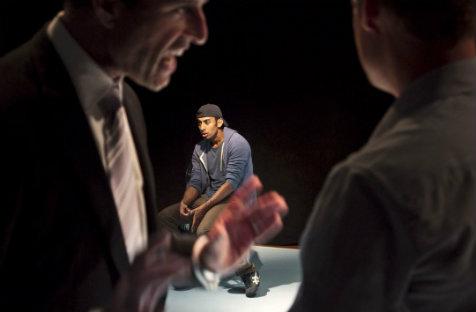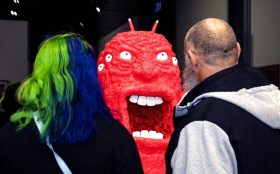Joe Penhall’s Blue/Orange is an important work of theatre. It explores mental illness, over-medicalisation, race, and the politics and pressures of the British health care system. It is, however, not very realistic.
In Blue/Orange, a young registrar psychiatrist and his senior consultant argue in an occasionally witty but mostly serious manner, for over an hour, about the diagnosis and fate of a patient. This argument manages to take in pretty much everything that’s worth discussing on the subject: the crippled, flawed systems that are in place for people suffering mental illness, the in-patient vs out-patient benefits and risks, the pressures on senior doctors to empty beds, the dangerous but useful eagerness to attach a label to patients straight out of the Diagnostic and Statistical Manual of Mental Disorders (edition IV), the difficulty of managing patients whose cultural ‘normalcy’ is unknown, the relative uselessness of available treatments. You name it, if it’s in the dirty laundry basket of the mental health system, it probably gets a mention.
Unfortunately, this rich, hour-long conversation would never take place. It is a total work of fiction; more than requiring a simple suspension of disbelief, the fiction itself unfairly hides some of the biggest flaws of the system: nobody challenges the senior consultant, nobody has time to enthusiastically argue about a patient’s discharge for three minutes, let alone an hour, and nobody has blithely held such discussions in front of a patient since 1957.
This sort of thing is forgivable if the quality of the performance is sufficient to get past it, and thanks to the utterly top-bloody-notch performance of Kane Felsinger as Christopher, the young patient, it just scrapes through. Utterly convincing as a black kid from the estates, his delivery was lightning-quick, his physicality radiated tension, and my psychiatrist companion assured me that his portrayal of schizophrenia was good enough to get him admitted without hesitation. Felsinger also has a bit of a leg up, in that Christopher is the only character of the three who is actually sympathetic.
As the two psychiatrists, Christian Heath (playing the young registrar, Bruce) and Richard Edge (as the older consultant, Robert) had a harder time maintaining believability. Heath’s performance rose swiftly in tone to C above high C, leaving him very little range to move when the character finally snapped, and causing him to flub lines. Despite some obviousness, Edge’s sauntering, self-aggrandising Robert had slightly better luck, managing to throw out some cracking good laughs, and the scenes with Edge and Felsinger were the highlight of the work.
Mockingbird’s production of Blue/Orange also suffered from a somewhat awkward set: a wide stage, in the round (or in the sandwich at any rate), with two Louis Ghost perspex chairs, a perspex coffee table with a perspex bowl of oranges, and a water cooler, all set about three or four hundred metres apart. Stylish and beautifully lit, but hardly a scene evocative of Britain’s NHS, not to mention enforcing quite a lot of pacing and facing away from the audience, and encouraging the chewing of what little scenery was available, just to fill the empty space.
Blue/Orange is a funny, difficult, interesting and flawed script, and Mockingbird Theatre could probably have made more out of it, but Felsinger’s performance, some great laughs all round, and some very interesting and controversial subject matter ensure it’s definitely worth a look.
Rating: 2½ stars out of 5
Mockingbird Theatre present
Blue/Orange
By Joe Penhall
Directed by Chris Baldock
Production Manager: Scott Middleton
Stage Manager/Operator: Jessica Mills
Performed by Kane Felsinger, Christian Heath and Richard Edge
Broken Mirror Studios, Brunswick
28 February – 9 March





